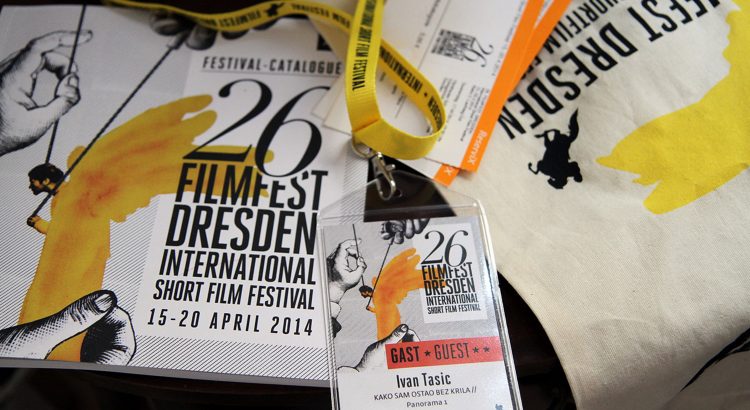Filmmakers with a short fiction or animation film: it‘s time for the Golden Horsemen. With prizes and awards worth over 62,000€, the 27th FILMFEST DRESDEN is not only one of the most important, it‘s also one of the best endowed short film festivals in Europe. The FilmFestivalLife festival has a brand new prize this year and it’s all about honouring the best sound. Festival Director Katrin Küchler is thrilled by the idea because she thinks that: ,A film does not impress only through images, composition, montage or camera. There’s also an auditive level which deserves taking a closer look, or well…ear at.‘ We had a chat with Küchler before submission time and she gave us seven exclusive tips for your film festival career that you shouldn‘t miss out on.
1. Read the regulations
First of all, the film must comply with our formal criteria; the submitted films for the competition must be in a broad sense narrative fiction or animation film. There are also some hybrid forms, for example more and more animated documentaries are being submitted, and also some fiction films with unconventional structures. There is a thin line with the definition and at the end it‘s upto the selection committee members to decide which film meets the criteria. The film must be not older than two years and it’s running time no longer than 30 minutes. My colleague Stefanie Forestier is always receiving some calls from people who are asking; ‘we have a 50 minute film, can we submit anyway?‘ We are just thinking – ,please read the rules’!
2. Let film festivals boost your film
We scout for films at other festivals. We‘re attending festivals and short films showcases around the world. If we think it would be a match with our program, we invite the filmmaker or we write a note to the filmmaker, informing them that we will have our Open Call in Autumn and that he or she should submit their film via our new partner platform.
These days we receive a lot of emails with Vimeo or Youtube links, footnoted with a request to consider it. We try to minimize this as much as we can and channel everything to one platform, because as a festival like FILMFEST DRESDEN with over 2,000 submissions every year, you cannot handle this mass of films otherwise.
3. Strategize your films festival life
When it comes to ‘where should I submit my film?’, I often have the feeling that filmmakers aren‘t really thinking further. A lot of them have no strategy at all! At the end it‘s important for every filmmaker not to screen their film anywhere that takes it, but to get in contact with the right industry people.
Also, do some research into the focus the festivals have. It makes no sense to submit your experimental film to FILMFEST‘s competition for example, because we don’t screen experimental films in our competition. The same applies to documentaries!
So this is what I would advise the filmmaker: make a plan, a real festival plan. One equipped with a timeline and deadlines, like when the film will be ready, possible first screening and the festivals that will have premiere status. So often filmmakers are ‘messing up’ their premiere when they submit without thinking to a festival and then get in. First you will be happy for being accepted, but then you missed the chance to screen at Cannes or Berlinale! It’s a highly complex process. The sheer range of platforms out there has made it indeed much easier to get an overview. But a lot of filmmakers are now engaging with services who take over the whole logistical effort. That’s a service sector that is growing a lot lately. And why not take some help? A good artist isn‘t automatically a good accountant with a savvy strategy.
4. Show yourself at festivals
Filmmakers should come to the festivals and present their films. That’s what festivals are made for. They live because of the films and the attendance of the filmmakers. It‘s also very beautiful for the audience to see who is behind the film. We welcome every filmmaker and we make sure that they‘re all having a great time. If we wouldn‘t do that you would just watch the films via a VOD platform. Festivals exist through these personal meetings. From person to person, that is the beauty about this métier.
The best conversations you‘ll get are eye to eye and start with a question like ‘I‘ve seen your film and would like to…’ or ‘do you have a producer for your next project…?’ Filmmakers are realising more and more that networking and traveling to the festivals is important to get your film in and then keep it in the festival circuit. That is simply essential.
5. Use crowdfunding as plan B
At the beginning of the year we still hadn’t received a donor for one of our main awards, the Golden Horsemen in the international competition. So we thought – why don’t we try to finance this through the crowd? We didn‘t know if it would be successful, but we tried and it had an amazing response. Even though we could count on our festival friends, it was also a good way to get to know new people and companies who hadn’t had contact with the FILMFEST before. That was a really nice side effect of the whole thing.
Crowdfunding is a new way to get money, but it is not the first method you should think of. You cannot see it as an alternative way of cultural film funding! The cultural film funding and funding for cultural projects in general is important and the people behind it shouldn‘t see this as a sign to be taking out of the responsibility. Crowdfunding should always be the plan B and not the plan A! You also can not exploit the generosity of people. You cannot say five years in a row – ‘open your pockets and give us your money’. It cannot work like this infinitely. At least that‘s my opinion. It‘s a great thing, an exciting phenomena and I‘m genuinely curious where all this is going.
6. Use your own signature
Filmmakers should show more courage in using their own signature style. With films from film schools, most of the time you can tell where the filmmaker has learned their craft. There are so many exciting films out there and a lot of them are made by autodidacts without a film school. They often have totally different ways of telling a story, or a point of view or how they use the camera aesthetics.
The best example is FILMFEST‘s funding award winner from last year Susann Maria Hempel. She wasn‘t at a film school, but she developed her own style and created her own aesthetic. I can imagine that the film world will say in a few years, that was a ‘Hempel‘. You really can see what makes her work different.
7. Submit your film to festivals
To the filmmakers all over the world: you have until the 5th December to submit your work to FILMFEST DRESDEN. We’re always looking forward to see the new films every year. Of course, the selection process is exhausting, but in the end we know why we‘re doing this and there are so many really great films out there!
And don‘t forget; films are made for people. When a film has something that grabs you in the first minutes, and you can’t stop watching it, then the film has for sure made it through to the second round of our selection process.
Katrin Küchler, Festival Director
FILMFEST DRESDEN
Apr 14 – 19, 2015
Dresden, Germany
Submit to FILMFEST DRESDEN on FilmFestivalLife:

Late Deadline: 05 December, 2014
Read more festival stories:
:: Short Feature Films, Workshops and Vinyl – FILMFEST DRESDEN opens for 2014
:: Where Wild Bisons meet Short Films – Zubroffka International Short Film Festival


